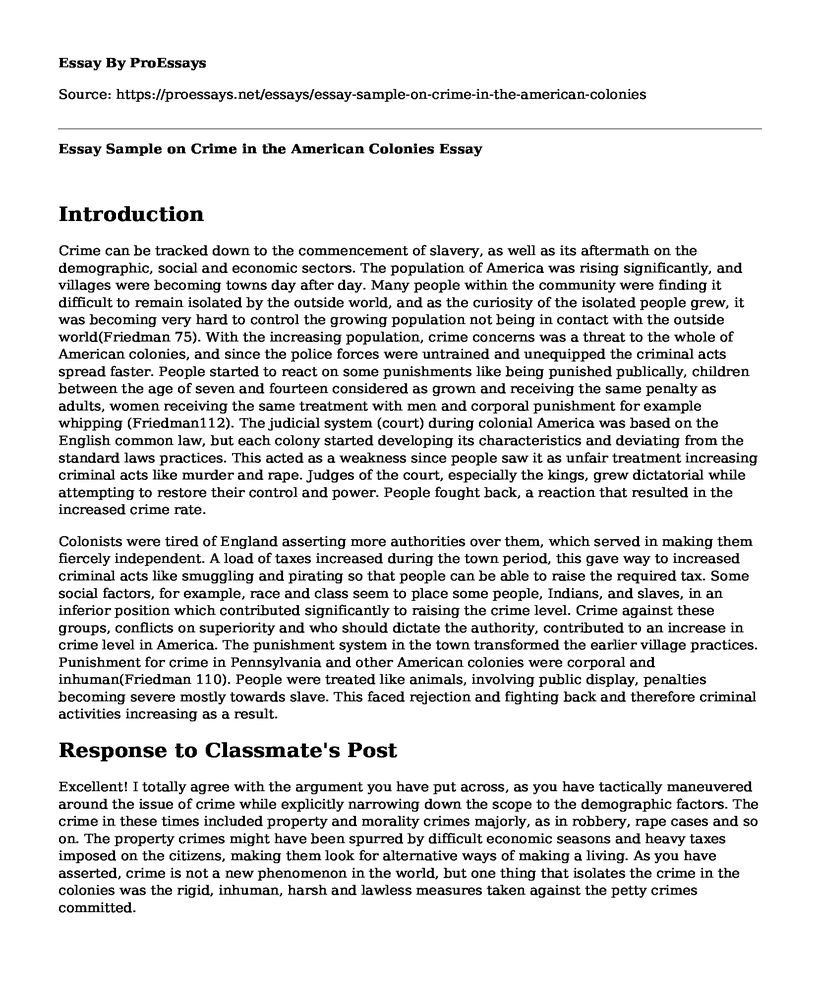Introduction
Crime can be tracked down to the commencement of slavery, as well as its aftermath on the demographic, social and economic sectors. The population of America was rising significantly, and villages were becoming towns day after day. Many people within the community were finding it difficult to remain isolated by the outside world, and as the curiosity of the isolated people grew, it was becoming very hard to control the growing population not being in contact with the outside world(Friedman 75). With the increasing population, crime concerns was a threat to the whole of American colonies, and since the police forces were untrained and unequipped the criminal acts spread faster. People started to react on some punishments like being punished publically, children between the age of seven and fourteen considered as grown and receiving the same penalty as adults, women receiving the same treatment with men and corporal punishment for example whipping (Friedman112). The judicial system (court) during colonial America was based on the English common law, but each colony started developing its characteristics and deviating from the standard laws practices. This acted as a weakness since people saw it as unfair treatment increasing criminal acts like murder and rape. Judges of the court, especially the kings, grew dictatorial while attempting to restore their control and power. People fought back, a reaction that resulted in the increased crime rate.
Colonists were tired of England asserting more authorities over them, which served in making them fiercely independent. A load of taxes increased during the town period, this gave way to increased criminal acts like smuggling and pirating so that people can be able to raise the required tax. Some social factors, for example, race and class seem to place some people, Indians, and slaves, in an inferior position which contributed significantly to raising the crime level. Crime against these groups, conflicts on superiority and who should dictate the authority, contributed to an increase in crime level in America. The punishment system in the town transformed the earlier village practices. Punishment for crime in Pennsylvania and other American colonies were corporal and inhuman(Friedman 110). People were treated like animals, involving public display, penalties becoming severe mostly towards slave. This faced rejection and fighting back and therefore criminal activities increasing as a result.
Response to Classmate's Post
Excellent! I totally agree with the argument you have put across, as you have tactically maneuvered around the issue of crime while explicitly narrowing down the scope to the demographic factors. The crime in these times included property and morality crimes majorly, as in robbery, rape cases and so on. The property crimes might have been spurred by difficult economic seasons and heavy taxes imposed on the citizens, making them look for alternative ways of making a living. As you have asserted, crime is not a new phenomenon in the world, but one thing that isolates the crime in the colonies was the rigid, inhuman, harsh and lawless measures taken against the petty crimes committed.
Works Cited
Friedman, L.M. (1993). Criminal and punishment in America history. New York: basic books pp.107-113.
Friedman, L.M. (1985). A history of America law, 2nd Ed. New York: touchstone books, p.75
Cite this page
Essay Sample on Crime in the American Colonies. (2022, Jul 27). Retrieved from https://proessays.net/essays/essay-sample-on-crime-in-the-american-colonies
If you are the original author of this essay and no longer wish to have it published on the ProEssays website, please click below to request its removal:
- Essay Sample on Recreational Marijuana Should Not Be Legal
- Essay Sample on Crime in New York Between 1850 and 1950
- Torture Is Never Justified - Argumentative Essay
- Essay Sample on Rights and Special Circumstances
- Save the Children's Foundation - Research Paper
- Analyzing UCR & Crime Trends: A Comprehensive Study - Essay Sample
- Essay Example on Border Patrol: Challenges of Protecting Borders in Crisis







